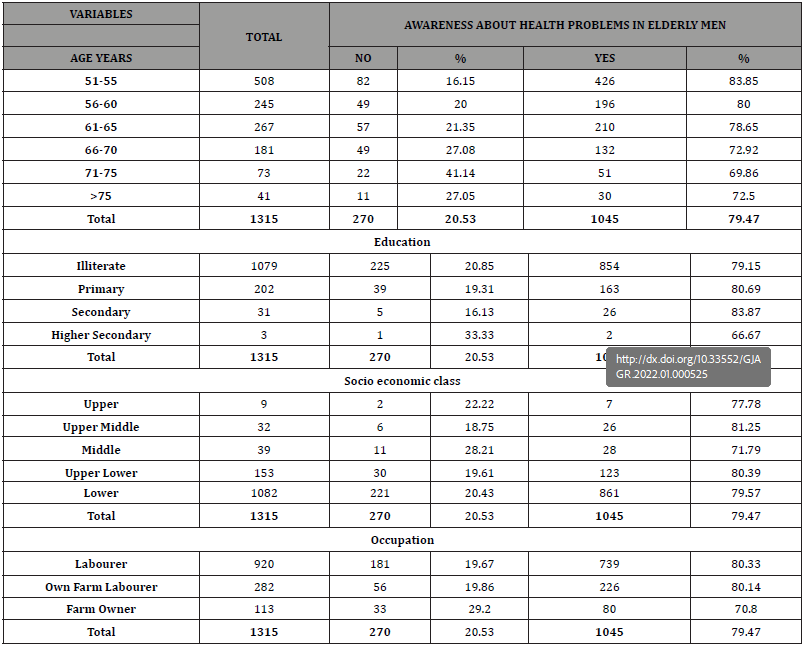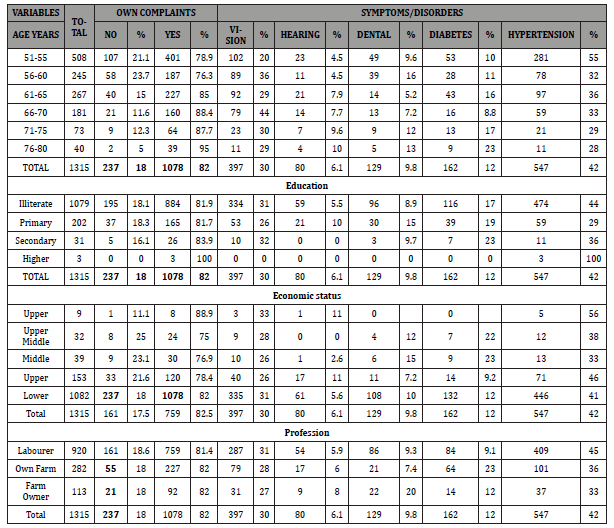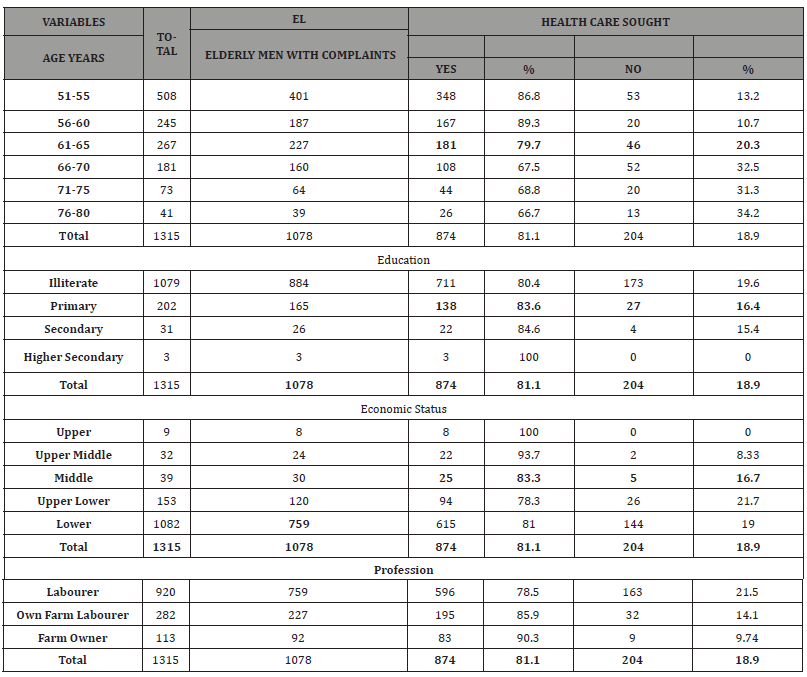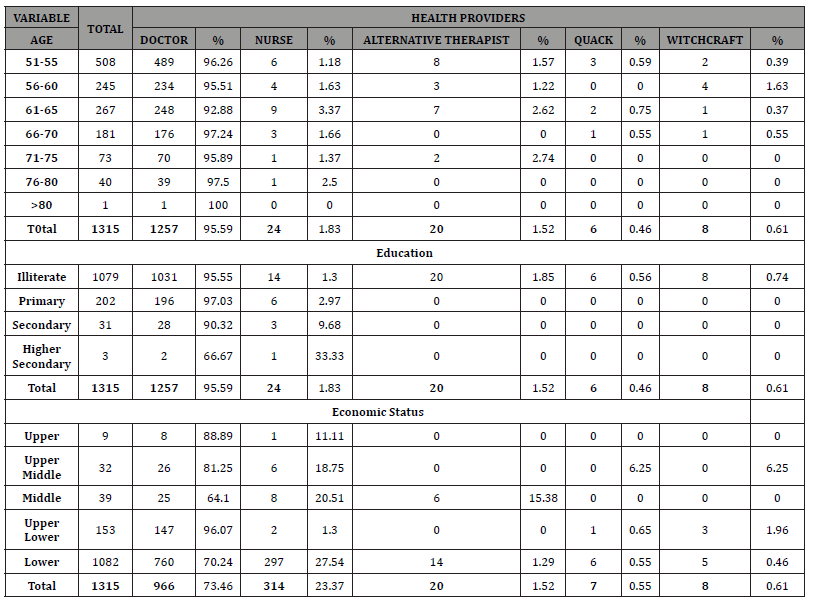 Research Article
Research Article
Community Based Study of Health Disorders in Aging Rural Tribal Men of A Forestry Hilly Region
S Chhabra1*, Thombre B1, Kanade M2
1Department of Obstetrics Gynaecology, Sushila Nayar Hospital, India
2Mahatma Gandhi Institute of Medical Sciences, India
S Chhabra, Department of Obstetrics Gynaecology, Sushila Nayar Hospital, India.
Received Date:January 13, 2022; Published Date:February 25, 2022
Abstract
Background Aging persons suffer globally, more in developing countries. Community based information of rural aging men is scarce.
Objectives Community based study was done to know about awareness of likely health disorders, care sought for own perceptions, right place for health care of rural tribal elderly men. Material, methods After institute’s ethics committee’s approval, community-based information was collected in 100 villages by research assistant using pretested tool by interviewing men beyond 50 years, minimum 10 from each village, 1315 study subjects with direct observations about eye sight, difficulty in walking and other visible problems. Blood pressure, blood sugar were measured .If blood pressure, blood sugar were beyond normal range, were repeated. Diagnosis of hypertension, diabetes was confirmed at base hospital. Results Overall, 81.97% of 1315 men had complaints. In 41.6 % high blood pressure was recorded, 30.2% vision problem, 12.3% diabetes, 9.8% teeth problems 6.1% difficulty in hearing. Of 1078 with health problems, 81.08% had sought care. Total 1045 (79.47%) of 1315 had some awareness about some health disorders likely in elderly men. Health providers suggested were doctors 95.59%, nurses 1.83%, alternative therapists 1.52%, quacks 0.46% and witchcraft 0.61%, especially for disorders like paralysis, fever, headache, jaundice. Conclusion There was lack of awareness, specially about fatal disorders which elderly men can have. Many did not seek care in spite of complaints. Some opined that quacks, witchcraft could provide care, not knowing it could be so dangerous. However, many knew about day-to-day life health disorders, had sought care, most suggested doctor for health care.Keywords:Elderly men, Disorders; Health seeking; Health Providers
Conflict of interest- Nil.
Funding and Acknowledgment - We acknowledge with thanks to Jan Kalyan Trust, Mumbai, Maharashtra, India for the financial assistance for
the study. We are grateful to the communities for the cooperation.
Background
Aging persons suffer a lot globally. They suffer more in developing countries, because of lack of required resources, health services, access problems, social support system and so on. Habib et al [1] reported that non-communicable diseases (NCDs) were the biggest threat to the aging population worldwide. Deaths from NCDs during still productive years can result in tragedy for the family with catastrophic expenditure. Community based health problems of elderly men and their quality of life is hardly known, especially in low- and middle-income countries (LMIC). Maharashtra is one of the few provinces of India with better health indicators. But in Melghat, rural, forestry and hilly region of the same state, tribal communities suffer irrespective of the age, due to extreme poverty, access problems, scarce health services, lack of awareness, lack of social support system and probably because of their own beliefs too. While trying to provide community-based mother and child health services, nurse midwives were requested by elderly women, mothers and mothers in laws of the pregnant women, to help them also for their ailments. When elderly women were helped, men too requested for help. So, it was decided to help men too for their health disorders as the mission of communitybased services was family health, community’s health with thrust on mother and child. For helping elderly men, it was essential to know their health disorders. So, the present study was done. As such community-based studies of disorders in aging rural tribal men are not many. Older people have become a major public health concern worldwide.
Objectives
Rural community-based study was done to know the awareness of health disorders which could occur among elderly men, care sought for their own health ailments and their perceptions about right place of health care.
Material and methods
After institution’s ethics committee’s approval communitybased study was done in 100 villages of Melghat region of Maharashtra province of India. In these villages mother and childcare services were initiated. It was decided to include men beyond 50 years of age, minimum 10 from each village by visiting every 10th house randomly. However, the exact age was not possible in many, as they did not know their birth dates and most men were illiterate. So the age was estimated by whatever means were locally possible. Some villages were small and others big and so a total of 1315 aging men, became study subjects. As per the objectives, information was collected by research assistant by using a pretested tool and, direct observations of health disorders, vision, difficulty in walking and other visible problems. Also, blood pressure and blood sugar were measured. If blood pressure was beyond normal range, it was repeated. If blood sugar was high, it was also repeated. Diagnosis of high blood pressure and diabetes was confirmed at the base hospital.
Results
Overall, 1078(81.97%) of 1315 men who were interviewed, had some health disorders. Of total 1315 men 547 (41.60%) had hypertension, 397 (30.2%) had eye sight problems, 162(12.3%) diabetes, 129 (9.8%) teeth problems and 80 (6.1 %) men had difficulty in hearing. Of the 1078 men who had health problems, 874(81.08 %) had sought health care. Of 508 men who were of 51- 55 years, 401(78.93%) had some disorders. A total, 281(55.31%) men had hypertension, 102(20.07%) vision problems, 53(10.43%) diabetes, 49(9.64%) dental problems and 23(4.52%) had hearing impairment. Of 41 men who were beyond 75-years of age, 39(95%) had some health-related complaints, 12(29.26%) had vision problems, 11 (26.82%) had hypertension, 9 (21.95 %) diabetis, 5 (12.19%) had teeth problems and 4(9.75%) had impaired hearing. Of 1079 illiterate men, 884(81.93%) had some health disorders. Total 334(30.95%) of 884 had eyesight problems, 59 (5.46%) had hearing impairment and 96(8.89%) teeth problems. Total 116(16.75%) were diabetic and 474(43.93%) had hypertension. All 3 with higher secondary educated men had complaints and were hypertensive too.
Of 9 upper economic class men, 8(88.89%) had complaints, 5(55.56%) were hypertensive, 3(33.33%) had vision problem and one (11.11%) had difficulty in hearing. Of the 1082 lower economic class men, 896(82.81%) had some complaints. Total 446 (41.22%) had hypertension, 335(30.96%) had vision problems, 132(12.19%) were diabetic, 108(9.98%) had teeth problems and 61(5.63%) had hearing impairment. Of 920 labourers ,759(82.50%) had health disorders, 409(44.46%) were hypertensive, 287(31.19%) had vision problems, 86(9.34%) had teeth problems, 84(9.13%) were diabetic, and 54(5.86%) had hearing difficulty. Among 113 farm owners, 92(81.42%) had health complaints, 37(32.74%) were hypertensive, 31(27.43%) had vision problems, 22(19.46%) had teeth problems, 14(12.38%) were diabetic and 9(7.96%) had hearing problem. Of 51-55 years old 508 men interviewed, 401(78.9%) had health related complaints and 348 (86.78 %) of them had sought health care. Of 41 men who were of 76-80 years old, 39 (95.12%) had some health complaints and 26 (66.66%) of them had sought health care. There was significant difference with age, and health care sought, with increasing age, health care seeking decreased (p value <0.05).
Of 1079 illiterate elderly men, 869(80.53%) had sought health care and all 3 higher secondary school studied men had sought health care. All 9 upper economic class men had sought care. Of 1082 lower class men 876 (80.96%) had sought health care. Economic class also affected the health seeking, with lower economic class less sought health care ( p value <0.05). Of 920 Labourers 723 (78.58 %) and of 113 farm owners, 102 (90.26 %) men had sought health care. Occupation also affected the health care seeking with significant difference between labourers and farm owners. (p value < 0.05).
Overall, 1045 (79.47%) of 1315 had awareness about health problems. Of 51-55 years old 508 men, 426 (83.85%) had some awareness of some health disorders likely in elderly men like difficulty in vision, hearing, dental problem, diabetes and hypertension. Of 41 men who were 76-80 years old of, 30(72.50%) had awareness of some health disorders, with no significant difference with age (p value > 0.05). Overall, a big number of elderly men, 1079 (82.05%) were illiterate, 854(79.15) of them had some awareness of some health disorders which elderly men could have. Of 3 higher secondary school educated also, 2(66.67%) had some awareness. Of 9 upper economic class men, 7(77.78) had awareness. Of 1082 lower economic class men, 861(79.57%) had some awareness. Again there was no difference with economic class too (p value >0.05). Of 920 men who were labourer 739(80.3%) did have some awareness and of 113 farm owners 80(70.80%) had some awareness of some health disorders. Study subjects were asked about the health care providers they would like for their own sicknesses. Of 1315 elderly men, 1257(95.59%) said doctors, 24(1.83%) nurses, 20(1.52%) said alternative therapists, 6(0.46%) said quacks and 8(0.61%) witchcraft too, especially for disorders like paralysis, fever, headache, jaundice etc. Of 508 men who were 51 to 55 years old, 489 (96.26%) said doctors, 6(1.18%) nurses, 8 (1.57%) alternative therapists, 3(0.59%) said quacks and 2(0.39%) said witchcraft. Of 41 men who were of 76 to 80 years, 40 (97.56%) said doctors, one (2.44%) said nurse and nobody said alternative therapists or quack or witchcraft. When asked about their opinion about health providers of 1079 illiterate men, 1031 (95.55%) said doctors, 14(1.3%) said nurses, 20(1.85%) said alternative therapist, 6 (0.56%) said quacks and 8 (0.74%) said witchcraft. Of 3 higher secondary school educated men, 2 (66.67 %) said doctors and one (33.33%) said nurse. Of 9 men of upper economic class, 8 (88.89%) said doctors and one (11.11%) said nurse. Of 1082 men of lower economic class, 760 (70.24%) said doctors, 297 (27.54%) said nurses, 14 (1.29%) said alternative therapists, 6(0.55%) said quacks and 5(0.46%) said witchcraft (P Value <0.1). Of the 920 labourers, 871(94.70%) said doctors, 19(2.06%) said nurses, 17(1.84%) said alternative therapists, 6 (0.65%) said quacks and 7 (0.76 %) said witchcraft. Of the 113 farm owner men, 112 (99.11%) said doctors and one (0.89%) said nurse.
Discussion
Courtenay [2] opined those men generally have harder time in adjusting to the changes of aging; Conditioned throughout their lives to be strong, controlling, emotions, independent, men can be devastated by the losses that are associated with aging. But not much research has been done in this field. Austad [3] has reported that some of the latest research indicated differences in the immune system in males which may be a big reason in men having shorter lives. Heart disease is a major concern for elderly men and women, but men are more likely to succumb to a heart attack, earlier in life than women [4]. Men and women have an approximately equal risk of developing the Alzheimer’s disease, but men have a notably higher incidence of Vascular Dementia than women [5]. Around, 500 000 elderly people go missing in China every year, around 25% of them diagnosed with Alzheimer’s or dementia, and 72% suffer memory impairment [6]. A study revealed that brain atrophy, which was a common consequence of many age-related ailments was more pronounced in men than women [7]. Such diseases were not talked by rural elderly men of tribal communities. Lack of awareness and various other reasons kept them away from health information. May be some men had dementia but did not even know. They had very scatchy awareness of disorders related to vision, hearing as health problems of elderly men. No one talked of myocardial ischemia, infarction, stroke, cancers, chronic bronchitis, paralysis, dementia or prostate problems. According to the World Health Organization, in some communities loneliness is also a major problem, currently underestimated but can affect physical as well as mental health in a myriad of ways [8].Overactive bladder in elderly is also a challenging disorder, since medication is not easy at this age [9]. Nothing was talked about such disorders in rural men. Such disorders in any way were not told by any men in the present study. They only talked about hearing problems, difficulty in vision, joint and muscular disorders. When asked about health care for elderly they talked of witchcraft and quacks too for some illnesses. It could be so dangerous at this age.
Fortunately, few men talked about this. It has been reported that American women lived five years longer than men because men had a propensity to high-risk behaviour like alcohol abuse, smoking and so on [10]. The issues are global, but in different form. Elderly needs proper care globally. The needs and styles are different. In rural tribal men of developing countries, men had different problems. So, knowing their perception is essential. It has been reported that in 2018, Australia’s Prime Minister announced, the Royal Commission for looking into Aged Care Quality and Safety Critically. The report found that older Australians had suffered a declining quality of care due to decreasing funding levels with successive government over 20 years [11]. Rural communities of low middle income countries (LMIC) have their own issues, drinking locally brewed alchohol , smoking bidi , tobacco chewing which have their sequel of hypertension, stroke, lung or oral cancers. They need preventive, therapeutic, rehabilitative care etc. But rural elderly men live with disorders which affected their everyday life and not difficult to diagnose and treat. They suffer because of various reasons. Some disorders are not even thought of a disorder as the disorder is taken as part of ageing in rural communities. Of 1315, elderly men, 1045 (79.47%) had awareness of some disorders, 270 (20.53%) elderly men did not have any awareness of any health problems which could occur in elderly men.Those who had awareness also did not talk of fatal conditions like myocardial infarction, chronic bronchitis, stroke, paralysis , enlarged prostate, cancers and so on. Nobody talked about dementia and overactive bladder.
Overall, 1078 out of 1315 (81.97%) interviewed men had some disorders, 602 (55.84%) had vision problems, 547 (50.74%) had hypertension, 114 (10.58%) had hearing impairment/loss, 99 (9.18%) had joint muscle pains, 81 (7.51%) diabetes and 44 (4.08%) had surgical disorders. A total of 244 (18.55%) men had multiple disorders. Of 1078(81.97%) health problems, 874(81.08 %) had sought health care. Lack of awareness and various other reasons kept them away from health care. So, even diagnosis of disorders was not made. It is essential to diagnose to threat. The World Health Organization has identified the prevention and control of NCDs as an urgent development issue essential for the achievement of the Sustainable Development Goals by 2030 [12]. In the present study of 1315 men, 162 (12.1%) men had diabetes and 547(41.60%) had hypertension. They talked of therapy by witchcraft and quacks as health provider. It could be so dangerous for elderly who may be having, cancer, myocardial disorder which might not get diagnosed and the sequel of delay in diagnosis. However, such numbers were small. Nutritional status and mental health deteriorate with aging. A study was performed to assess the association between malnutrition and depression among rural elderly by Vafaei et al [13] and it was revealed that the risk of severe depression in patients with malnutrition was 15.5 times higher than non-depressed person and researchers opined that depression could act as a powerful risk for malnutrition in elderly population that it should be controlled by physicians. Impaired mental health has been strongly associated with the risk of malnutrition in community in elderly men and women. Aging induces physiological changes and affect all organs. Ye P et al [14] reported that in China between 1990 and 2019, the incidence rate of falls increased substantially in older adults across mainland China, whereas the rates of mortality and Disability Adjusted Life Year (DALY) of falls among older people remained relatively stable, suggesting improvements in outcomes of falls.
In the study by Kshetri [15] which aimed to identify the felt common health problems, utilisation of health services and unmet needs of urban and rural elderly people in Nepal, it was revealed that the common felt problems were pain and swelling of joints (65.7%) and indigestion (63.7%) in urban, excessive tiredness (38.2%) and hypertension (35.8%) in rural. Pain and swelling of joints (72.5%) and back pain (40.4%) in rural, higher, and indigestion (67.6) and hypertension (37.85%) in urban, higher. The unmet needs varied between different health problems. In the present study, overall, 1078(81.97%) of 1315 interviewed had some healthrelated complaints. 547 (50.74%) had hypertension, 397 (30.2%) had vision problems, 162(12.3%) diabetes, 129 (9.8%) teeth related problems and 80 (6.1 %) had difficulty in hearing. Of 1078 (81.97%) with health problems, 874(81.08 %) had sought health care. Overall, 1045 (79.47%) had awareness about health disorders likely in elderly men but they did not have awareness about dangerous disorders. When asked about health care providers they would like for health care, of 1315 men 1257(95.59%) said doctors, 24(1.83%) nurses, 20(1.52%) said alternative therapists, 6(0.46%) said quacks and 8(0.61%) witchcraft too , especially for disorders like paralysis, fever, headache, jaundice. So, over all there was lack awareness of dangerous disorders. Of everyone who had problems, quite a few did not have any awareness. But these who had awareness did not talk of cancers, myocardial ischemia or infarction. It is essential that they have awareness so that they try to remain health (Table 1-5).
Table 1:Awareness of Health Problems in Elderly Men.

Table 2:Disorders in The Elderly Men.

Table 3:Health Care Sought by Elderly Men with Complaints.

Table 4:Health Providers Desired.

Conflict of interest:
None.
Acknowledgments:
None.
References
- Courtenay WH (2000) Constructions of masculinity and their influence on men's well-being: a theory of gender and health. Social science & medicine 50(10): 1385-1401.
- Austad SN (2006) Why women live longer than men: sex differences in longevity. Gender medicine 3(2): 79-92.
- O'Brien R, Hart G, Hunt K (2007) "Standing out from the herd": men renegotiating masculinity in relation to their experience of illness. International Journal of Men's Health 6(3).
- Mielke MM, Vemuri P, Rocca WA (2014) Clinical epidemiology of Alzheimer’s disease: assessing sex and gender differences. Clinical epidemiology 6: 37-48.
- Qiu J (2007) Ticking time bomb faced by China's ageing population. The Lancet Neurology 6(7): 582-583.
- Fritz RG, Zimmermann E, Picq JL, Lautier C, Meier M (2020) Sex-specific patterns of age-related cerebral atrophy in a nonhuman primate Microcebus murinus. Neurobiology of aging 91: 148-159.
- Crewdson J (2016) The effect of loneliness in the elderly population: A review, Healthy aging & clinical care in the elderly 8: 1-8.
- Fernandez B P, Hernandez D H, Morgenstern S, Masip T, Castro-Diaz D (2015) Treatment of overactive bladder in elderly patients: clinical considerations, Clinical medicine insights: Geriatrics 8: 11-20.
- Becker JB, McClellan ML, Reed BG (2017) Sex differences, gender and addiction. Journal of neuroscience research 95(1-2): 136-147.
- Cousins S (2021) Australian Commission calls for overhaul of aged care. The Lancet 397(10278): 957
- Meghji J, Mortimer K, Agusti A, Allwood BW, Asher I (2021) Improving lung health in low-income and middle-income countries: from challenges to solutions. Lancet 397(10277): 928-940.
- Vafaei Z, Mokhtari H, Sadooghi Z, Meamar R, Chitsaz A (2013) Malnutrition is associated with depression in rural elderly population. Journal of research in medical sciences: the official journal of Isfahan University of Medical Sciences 18(Suppl 1): S15-S19.
- Kshetri DB, Smith WC (2011) Self-reported health problems, health care utilisation and unmet health care needs of elderly men and women in an urban municipality and a rural area of Bhaktapur District of Nepal. The Aging Male 14(2): 127-131.
- Habib SH, Saha S (2010) Burden of non-communicable disease: global overview. Diabetes & Metabolic Syndrome: Clinical Research & Reviews 4(1): 41-47.
- Ye P, Er Y, Wang H, Fang L, Li B (2021) Burden of falls among people aged 60 years and older in mainland China, 1990–2019: findings from the Global Burden of Disease Study 2019. The Lancet Public Health 6(12): e907-18.
-
S Chhabra, Thombre B, Kanade M. Community Based Study of Health Disorders in Aging Rural Tribal Men of A Forestry Hilly Region. Glob J Aging Geriatr Res. 1(5): 2022. GJAGR.MS.ID.000525.
-
Elderly men, Disorders; Health seeking; Health Providers
-

This work is licensed under a Creative Commons Attribution-NonCommercial 4.0 International License.






